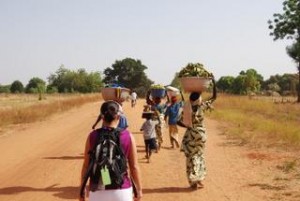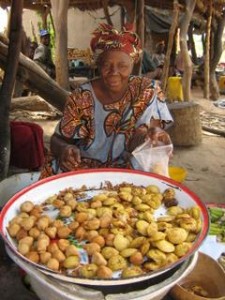There is one road in Mahadaga. It is name-less but everyone knows it well. The Burkinabe live their lives on it, near it, around it, beside it. They buy and sell and visit each other on it, work their fields beside it, and celebrate important events under the shade of the mango trees along it. To journey into the lives of the people here, we have needed to learn how to walk along this road. And we are learning. We’re becoming familiar with its rises and dips, its rough and smooth parts, its comings and goings, as our feet walk this road each and every day:
As the sun rises in the morning we can already hear the motorbikes traversing along it and the street vendors sweeping the dirt around their shops to prepare for their work day. From the road one can hear and see more than one woman pounding grain for the morning meal. Groups of children giggle and greet each other while kicking up clouds of dirt as they walk to school. There are the men we fondly call the “Burkina bike team” who make their way in the early light- a group of men carrying supplies strapped to their bicycles from one town to the next. The donkeys and pigs, guinea fowl and chickens, dogs and goats, sheep and roosters make their footprints too into the sandy turf below the rush hour traffic. They weave and meander, generally to the agitation of those trying to pass along the route.
People begin greeting everyone early in the day on this road. It doesn’t matter the time of day or if you saw someone five minutes earlier, you are never an outsider, never excluded on the Mahadaga road. Children run to wave and greet you, bicycling men and women smile and say hello, and street vendors never ignore you. You cannot walk this road alone as you are constantly surrounded by the hum of people who know you by name or appearance. When your bicycle breaks down there are 7 people to instantly come to your rescue. When you go for a walk along it people want to know where you are going or coming from. Or, they might even join you. One time we had a herd of children following along behind us. When we stopped to look at something, they all stopped and looked too, even though we couldn’t communicate what we were looking at.
At midday the hum continues. There is the sizzling sound of flour cakes being cooked in hot oil over open fires. There is the bartering and exchanging of coins for the local produce displayed on woven mats along the roadside. There is the whirring of motor bikes, the ringing of a cell phone or two, and the loud boisterous laughter, clucking of tongues, and slapping of hands as friends reunite. Kids take long sticks and tap, tap against the tall mango tree branches, hoping for a ripe mango to fall. Or one can hear the tap tapping of sticks against a donkey’s behind as the animal pulls a cart full of hand-made bricks, crops, or some sleeping kids. Large trucks are seen coming for a long distance with their large, straining loads of cotton or other merchandise. Even though work and school stops for over 2 hours when the sun is at its hottest, the road never sits quietly.
As the afternoon marches onwards the children return to school and the road lives on. Singing and reciting can be heard from the classrooms or the distant sound of drums for a funeral. The squeaking, turnstyle metal gate at the medical clinic continues constantly as people come and go. Newborn baby cries can be heard in the clinic not far from the road as well as the wailing of sick children receiving their unwelcomed treatments. Hand pumps for water wells are never left idle, nor are the mechanized mills for millet and corn (available for those who can afford it). Tailors have foot-controlled sewing machines that whirr and there are women gathering around a head or two, braiding hair. People walk carrying anything and everything on their heads, backs, bikes, and motos. Women are always heavy-laden with household finds, especially on Thursdays (market day). Babies are strapped to backs of older children and mothers, their heads neatly tucked into “tuques.” The pitter pattering of bare feet on hot, rocky sand is constant, and always a reminder of our weak feet and our inability to go unnoticed (as its usually a child or two running to say hello).
As the evening approaches, one may or may not be able to see the sun. The air is thick and heavy with dust. One can taste it and smell it. It lays heavy upon the horizon as the night approaches. People return to their homes after work and visiting. Roadside shops become emptier and bikes become less frequent. But as we take our evening stroll we continue to greet onlookers. The few lights of “torches” (flashlights) and small generator powered lights are seen from far off in the distance as there are few of them. Groups of people crowd around on benches near shops and listen to music blaring from radios. They talk and sit, and again we greet them. They tell us to have a “good sport” and we continue onwards only to return back the same way. The moon sometimes casts shadows it’s so bright and then the whole town is on the road with us- bike riding and eating, visiting and sharing their day with one another. But when the night is dark, one must strain to see the approaching biker or stray animal. The road is quiet, but not empty. Never empty. Life passes alongside it. Mosquitos whir in the air, and the sound of dogs and donkeys continue on as fires are lit and people head to their beds to sleep outside their houses where it is cooler.
Another day on the road in Mahadaga. At first light everyone is awake and out, traversing the same road again and again, day after day.
I like thinking about this road and all that it witnesses. It carries the weight of small children and large over-burdened trucks. It is a reminder to us of the simple things, the important things, and the normal things that make up life wherever you are: coming and going, working and playing, friends and fellowship, sickness and exercise, all that life brings can be found on this one road. It is so thick with sand you sink in it and you have to fight others who are biking or riding motos for the one route (a tire track) of hard enough sand to travel on. We must share the road with everyone: those with shoes and those without, those who are on two feet, or four. When you want to be ignored, you can’t be. You are always greeted, always smiled at, and never left alone. But we love it. We pray that wherever we live we will be reminded of this Mahadaga road and the simple, daily, important things that we are to be faithful to God in. And who knows, maybe one day we’ll come back here and find the road hasn’t changed one bit and then with a bit of time and practice, we’ll be able to run barefoot on the hot sand of this road like the kids do.


2 responses to “The Road”
I am REALLY enjoying your entries! Thanks for sharing so thoughtfully.
No sé bien cómo llegué a tu blog. Me gustó mucho!. Saludos!